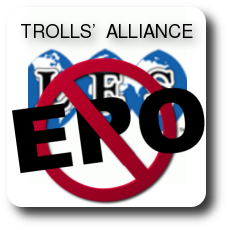
 Summary: The top-level management of the European Patent Office (EPO) -- António Campinos just like his predecessor -- does not care about the advancement of science but the advancement of litigation agenda by all means available, even software patents in Europe
Summary: The top-level management of the European Patent Office (EPO) -- António Campinos just like his predecessor -- does not care about the advancement of science but the advancement of litigation agenda by all means available, even software patents in Europe
THE CURRENT Director of the U.S. Patent and Trademark Office (USPTO) comes from the litigation industry, so it's hardly surprising that he opposes 35 U.S.C. ۤ 101. He's supposed to follow the law, not decide on the law, but just like in the EPO what we're seeing these days is a bunch of managers who spit on the law (disregarding if not attacking judges), ignore courts, and strive for nothing but patent maximalism. This is a crisis.
"We have sadly come to a point where the EPO is very blatantly and shamelessly on the side of parasites, not science. The EPO has sided with people who prey on scientists instead of the scientists themselves."This is about the Licensing Executives Society International (LESI), or just LES, which is a front group of patent trolls. These are not scientists, so what kind of inspiration can they offer to real businesses as opposed to parasites with a patent or two?
We have sadly come to a point where the EPO is very blatantly and shamelessly on the side of parasites, not science. The EPO has sided with people who prey on scientists instead of the scientists themselves.
Look no further than the EPO's stance on software patents. What proportion of programmers want such patents to exist? 1%? Less?
"Look no further than the EPO's stance on software patents. What proportion of programmers want such patents to exist? 1%? Less?"Benjamin Henrion has just recalled Chirac's stance on software patents [1, 2, 3], due to the news about Chirac's death. It's a reminder that he lasted 12 years in power and became an iconic personality in France (Henrion is a French-speaking Belgian). Henrion also recalled Chiraq's betrayal. Initially, as a campaign promise, he sided with software developers.
Yesterday we saw this new article from Phillips & Leigh. It's about an upcoming EPO case regarding software patents. The authors went ahead with an intentionally wrong question. They should have instead asked, "are software patents legal in Europe and can EPO grant them?" The answer is "NO!"
But here's how they put it:
We have previously brought attention to a recent referral to the European Patent Office's Enlarged Board of Appeal concerning the question of whether a computer-implemented simulation of a technical system or process could be patentable in and of itself, provided that the simulation could give rise to a technical effect above and beyond the simulation's implementation on a computer.
The President of the European Patent Office has now submitted comments on the referral to the Enlarged Board of Appeal. The comments represent an interesting set of arguments broadly in support of the notion that such a simulation could at least in principle be patentable. Rather than rehashing the full comments here, we consider it more broadly informative to take a close look at its summary.
First, it is evident both from the summary and the comments as a whole that the Office's arguments are based on the idea that the statutory exclusions from patentability in the European Patent Convention should be interpreted narrowly, and that a "dynamic understanding" should be applied to the terms "technical" and "technology".
[...]
The other major point made in the summary is that it shows the suitability of the EPO's established problem-and-solution approach for assessing patentability (specifically, it is a method of assessing inventive step, one of the essential prerequisites of patentability) and argues that this provides a reasonable way to assess such inventions.
What is clear from the case law and the requirements of the European Patent Convention and Implementing Regulations is that to secure grant, two conditions must be met: the product or process to be protected must be defined in the claim by means of its technical features, and there must be a technical effect.
The essence of the case before the Enlarged Board of Appeal is whether that technical effect needs to be the direct consequence of the claimed invention, or can be "downstream".
"As we've explained here before (perhaps a dozen times), the Enlarged Board of Appeal is pretty powerless to decide against the wishes of the Office (management openly supports software patents) because it lacks independence."Henrion has taken note of this "new entry in the EUROPEAN SOFTWARE PATENTS knowledge base," which demonstrates how certain software patents are not valid in Europe. So says the advice from the biggest boosters of software patents in Europe (a litigation firm; "They recruited one the EPO swpat booster," Henrion told me, "who invented the technical blackhole.").
We had a little debate about it in Twitter.
"Technical effects in patent law are a farce," wrote André Rebentisch, who used to be hyper-active in FFII over a decade ago.
"Software patents have long been a good example where EPO management intentionally ignores the wishes of actual software practitioners, choosing instead the agenda of trolls and litigation firms that never wrote any software.""It's intentionally vague," I replied, "like "4IR", "IoT", and "HEY HI" (AI), so we're dealing with nonsensical semantics and buzzwords instead of solid science, code, automatons..."
"The recent AI discussion is ever more off," he said, citing this page from the EU. "As an observer I would guess that the rlatest EBoA design simulation case aims to pave the way for ML patent applications..."
Software patents have long been a good example where EPO management intentionally ignores the wishes of actual software practitioners, choosing instead the agenda of trolls and litigation firms that never wrote any software. ⬆